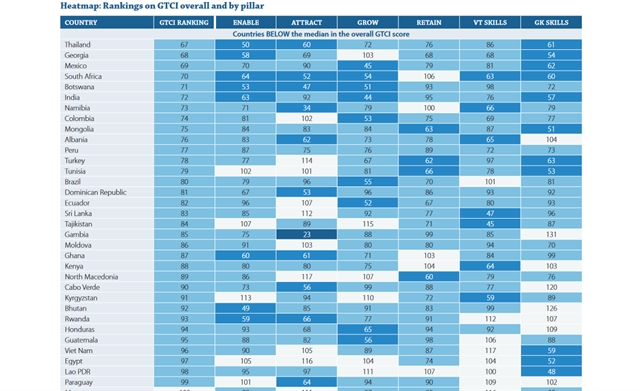Viet Nam is ranked 96 out of 132 countries on the 2020 Global Talent Competitiveness Index (GTCI), down four positions compared to last year and nine positions in 2018.

Viet Nam ranks 96 out of 132 countries on the 2020 Global Talent Competitiveness Index (GTCI), down four positions compared to last year and nine positions in 2018.
GTCI is an annual bench-marking report that measures and ranks countries based on their ability to grow, attract and retain talent.
The report combines the academic research and expertise of INSEAD, the international business school, with the business experience and perspective of The Adecco Group and Google.
This year’s report showed that the gap between Viet Nam and other high-income countries in terms of digital skills, especially artificial intelligence (AI), is significant.
The report shows that high-income countries develop technology quickly and are in the top 25.
Thanks to AI technology, these countries are far ahead of other countries including Viet Nam, as more than half of the population in developing countries are still learning basic digital skills.
Classified as a low-middle income group in Eastern, Southeastern Asia and Oceania, Viet Nam stands out from its region of global knowledge skills, ranking 59th globally, up 10 places compared to last year.
Meanwhile, vocational and technical skills are in need of improvement, as the country stands at 117th place.
In addition, the country's rank of attracting talent decreased from 91st last year to 105th this year.
For the category of robot density, Viet Nam ranked 41st place, higher than the other half of the world.
However, Viet Nam ranked 102nd in using technology and 65th in investing in new technologies, a relatively low position compared to other countries in the region such as Thailand and India.
Andree Mangels, general director of Adecco Viet Nam, commented that Viet Nam still had a big gap between training and business needs. The emergence of artificial intelligence required new skills training for the workforce, Mangels said.
Launched for the first time in 2014, the GTCI provides a wealth of data and analysis that helps decision-makers develop talent strategies, overcome talent mismatches and become more competitive in the global marketplace.
Themed "Global Talent in the Age of Artificial Intelligence", this seventh edition of GTCI explores how the development of AI is not only changing the nature of work but also forcing a re-evaluation of workplace practices, corporate structures and innovation ecosystems.
This topic stands at the heart of the debate in this era of the Fourth Industrial Revolution as AI has become a game-changer in every industry and sector. — VNS





